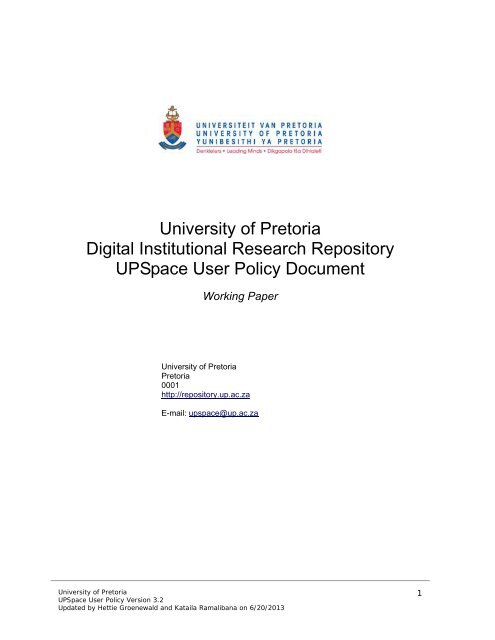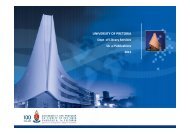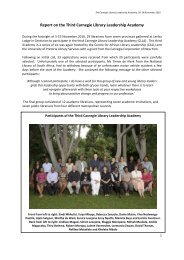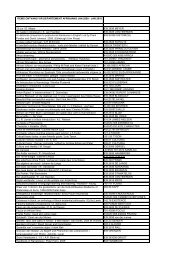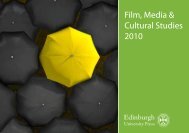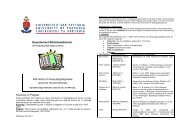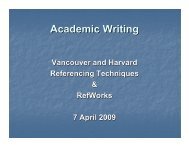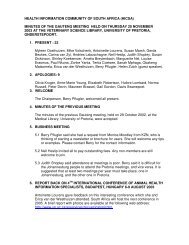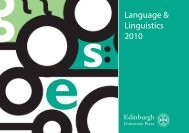UPSpace Policy - Library - University of Pretoria
UPSpace Policy - Library - University of Pretoria
UPSpace Policy - Library - University of Pretoria
You also want an ePaper? Increase the reach of your titles
YUMPU automatically turns print PDFs into web optimized ePapers that Google loves.
<strong>University</strong> <strong>of</strong> <strong>Pretoria</strong><br />
Digital Institutional Research Repository<br />
<strong>UPSpace</strong> User <strong>Policy</strong> Document<br />
Working Paper<br />
<strong>University</strong> <strong>of</strong> <strong>Pretoria</strong><br />
<strong>Pretoria</strong><br />
0001<br />
http://repository.up.ac.za<br />
E-mail: upspace@up.ac.za<br />
<strong>University</strong> <strong>of</strong> <strong>Pretoria</strong><br />
<strong>UPSpace</strong> User <strong>Policy</strong> Version 3.2<br />
Updated by Hettie Groenewald and Kataila Ramalibana on 6/20/2013<br />
1
Table <strong>of</strong> Contents<br />
1. About <strong>UPSpace</strong> 3<br />
2. <strong>UPSpace</strong> Project Evaluation Committee 3<br />
3. <strong>UPSpace</strong> User Group 4<br />
4. Open Access Approach at UP Libraries 5<br />
5. Submission <strong>Policy</strong> 5<br />
6. <strong>Policy</strong> on Communities/Collections within <strong>UPSpace</strong> 9<br />
7. Responsibilities & Services: Dept. <strong>of</strong> <strong>Library</strong> Services,<br />
<strong>Library</strong> Information Systems & Technology & Dept. <strong>of</strong> IT 11<br />
8. Rights <strong>of</strong> the Dept. <strong>of</strong> <strong>Library</strong> Services 12<br />
9. Responsibilities <strong>of</strong> the <strong>University</strong> <strong>of</strong> <strong>Pretoria</strong> 12<br />
10. Responsibilities <strong>of</strong> the Unit for Information Systems & Technology 12<br />
11. Licensing, Copyright, Privacy and Intellectual Property 12<br />
12. Services <strong>of</strong>fered through <strong>UPSpace</strong> 14<br />
13. Preservation <strong>Policy</strong> & Support 14<br />
14. Withdrawal policy 17<br />
15. Workflow <strong>Policy</strong> 17<br />
16. Persistent Identifiers in <strong>UPSpace</strong> 20<br />
17. Metadata Standards 20<br />
18. Provenance data tracked by <strong>UPSpace</strong> 21<br />
19. Authentication in <strong>UPSpace</strong> 21<br />
20. <strong>UPSpace</strong> Server Details 21<br />
21. Service Level Agreements 21<br />
22. Communication 22<br />
<strong>University</strong> <strong>of</strong> <strong>Pretoria</strong><br />
<strong>UPSpace</strong> User <strong>Policy</strong> Version 3.2<br />
Updated by Hettie Groenewald and Kataila Ramalibana on 6/20/2013<br />
2
1. About <strong>UPSpace</strong><br />
”In supporting Open Access, <strong>UPSpace</strong> is the UP archive <strong>of</strong> research output produced, submitted and<br />
sponsored by the UP Community and research material donated to the <strong>University</strong> <strong>of</strong> <strong>Pretoria</strong> for long<br />
term preservation, distribution on the web and to create visibility <strong>of</strong> the <strong>University</strong> <strong>of</strong> <strong>Pretoria</strong> and the<br />
authors internationally “ Pienaar, H. 2012. Strategic Planning 2012-2025, E-Service Unit. Department<br />
<strong>of</strong> <strong>Library</strong> Services, <strong>University</strong> <strong>of</strong> <strong>Pretoria</strong>.<br />
Attributes <strong>of</strong> a trusted repository are achieved by complying with the Reference Model for an Open<br />
Archival Information System (OAIS):<br />
An ISO standard (approved in 2003 and updated in 2009) that formally expresses the<br />
Roles, Functions and Content <strong>of</strong> an Archive at http://digi.nrf.ac.za<br />
The repository uses DSpace TM version 1.8.2 s<strong>of</strong>tware, developed at MIT with support from Hewlett<br />
Packard, which complies with the Open Archives Initiative (OAI); thus allowing items to be easily<br />
discovered by web search engines, services and indexing tools.<br />
Each item in the repository is assigned a unique persistent identifier, using the CNRI Handle System.<br />
The identifiers are resolvable in perpetuity, and will remain valid even if content migrates to a new<br />
system. This allows documents in the repository to be properly and effectively cited in other research.<br />
* The UP Community refers to:<br />
• Present and future staff members <strong>of</strong> the Department <strong>of</strong> <strong>Library</strong> Services, <strong>University</strong> <strong>of</strong><br />
<strong>Pretoria</strong>;<br />
• Past, present and future academic staff at the <strong>University</strong> <strong>of</strong> <strong>Pretoria</strong>;<br />
• Focus areas, faculties, centers, institutes and research divisions at UP.<br />
2. <strong>UPSpace</strong> Project Evaluation Committee<br />
2.1 Focus <strong>of</strong> the <strong>UPSpace</strong> Project Evaluation Committee<br />
It will be the responsibility <strong>of</strong> the <strong>UPSpace</strong> Project Evaluation Committee to evaluate applications<br />
(see Application form available at ) for new projects to be hosted on <strong>UPSpace</strong>. This will include:<br />
the capacity <strong>of</strong> the <strong>UPSpace</strong> server, copyright <strong>of</strong> material cleared or Letter <strong>of</strong> Consent received, the<br />
digitisation <strong>of</strong> material, adding retrospective material to existing collections, as well as the creation <strong>of</strong><br />
new collections on <strong>UPSpace</strong>. The availability <strong>of</strong> metadata editors and role players in the workflow <strong>of</strong><br />
the collections will also be considered, to ensure quality control on <strong>UPSpace</strong>, and to adhere to the<br />
attributes <strong>of</strong> a Trusted Repository. Projects accepted, will be prioritized according to above-mentioned<br />
terms and conditions.<br />
The <strong>UPSpace</strong> Project Evaluation Committee’s role will be ongoing; issues will be revisited on a<br />
regular basis, and as new issues arise. The <strong>UPSpace</strong> Project Evaluation Committee’s decisions will<br />
take into consideration the Department <strong>of</strong> <strong>Library</strong> Service’s overall mission, as well as the <strong>University</strong><br />
<strong>of</strong> <strong>Pretoria</strong>’s mission and goals, so as to ensure that the <strong>UPSpace</strong> service is aligned with these.<br />
2.2 Role <strong>of</strong> the <strong>UPSpace</strong> Project Evaluation Committee<br />
The <strong>UPSpace</strong> Project Evaluation Committee will make decisions related to <strong>UPSpace</strong> services,<br />
standards, and functionality. When the committee’s decisions have significant financial, service, or<br />
public relations impact, the issues will be referred to the Department <strong>of</strong> <strong>Library</strong> Services Management<br />
Team, made up <strong>of</strong> senior library administrators, for endorsement.<br />
<strong>University</strong> <strong>of</strong> <strong>Pretoria</strong><br />
<strong>UPSpace</strong> User <strong>Policy</strong> Version 3.2<br />
Updated by Hettie Groenewald and Kataila Ramalibana on 6/20/2013<br />
3
2.3 Composition <strong>of</strong> the <strong>UPSpace</strong> Project Evaluation Committee<br />
The committee includes the following:<br />
Assistant Director; E-Service Unit, Dept.<strong>of</strong> <strong>Library</strong> Services (Chair)<br />
IR Manager<br />
IR Systems Manager<br />
Manager; Digitisation Office<br />
Coordinator; Metadata Editors<br />
Meetings will be arranged as requested by the IR Manager, and will then include Ad hoc members<br />
affiliated with the project.<br />
3. <strong>UPSpace</strong> User Group<br />
3.1 Focus <strong>of</strong> the <strong>UPSpace</strong> User Group<br />
It will be the responsibility <strong>of</strong> the IR Manager to inform the <strong>UPSpace</strong> User Group on operational level<br />
including:<br />
new policies;<br />
upgrading to a new version;<br />
enhancements;<br />
changes in workflow;<br />
guidelines and policies;<br />
quality control;<br />
sharing monthly statistics<br />
The IR Manager will share the implementation <strong>of</strong> policy decisions taken by the <strong>UPSpace</strong> Project<br />
Evaluation Committee<br />
3.2 Composition <strong>of</strong> the <strong>UPSpace</strong> User Group<br />
This team includes the following individuals and meetings will be arranged as needed:<br />
IR Manager<br />
IR IT Support Manager<br />
Digitisation Specialist<br />
Metadata Specialist<br />
Open Access Specialist<br />
Copyright Officer<br />
Special Collections Representative<br />
Representatives (Information Specialists) from Faculty Libraries – give feedback to team<br />
Representatives (UP Departments) involved in <strong>UPSpace</strong> collections<br />
3.3 Notes <strong>of</strong> these meetings will be made available to all relevant parties via the<br />
upspace@kendy.up.ac.za mailing list.<br />
<strong>University</strong> <strong>of</strong> <strong>Pretoria</strong><br />
<strong>UPSpace</strong> User <strong>Policy</strong> Version 3.2<br />
Updated by Hettie Groenewald and Kataila Ramalibana on 6/20/2013<br />
4
4. Open Access Approach at UP Libraries<br />
Research is not always accessible to all, and <strong>of</strong>ten only to the benefit <strong>of</strong> those who can afford to<br />
subscribe to very expensive databases. The Department <strong>of</strong> <strong>Library</strong> Services supports open access to<br />
all research conducted by members <strong>of</strong> the UP community, provided that patents, copyright and<br />
intellectual property rights issues are taken into account, and the laws that govern these issues are<br />
adhered to. Through making UP research output freely available for all to access and use, we would<br />
like to help increase the usage, impact and citation rate <strong>of</strong> research conducted by our members, as<br />
well as the visibility <strong>of</strong> the <strong>University</strong> <strong>of</strong> <strong>Pretoria</strong> on international level. This can in turn impact on the<br />
NRF-rating and H-index <strong>of</strong> individual researchers, and the listing <strong>of</strong> the <strong>University</strong> <strong>of</strong> <strong>Pretoria</strong> on the<br />
Shanghai <strong>University</strong> List. Also refer to the UP Open Access Mandate (August 2009).<br />
Currently there are two currents in the Open Access movement:<br />
• OA self-archiving in institutional repositories (“green” road to OA)<br />
• OA publishing (“gold” road to OA – see e.g. DOAJ)<br />
In addition to archive their research output within the institutional repository, researchers are<br />
encouraged to publish in journals supporting the gold road.<br />
5. Submission <strong>Policy</strong><br />
5.1 Persons allowed to submit content to <strong>UPSpace</strong><br />
<br />
Any UP staff member or research member <strong>of</strong> the UP Community may submit items to the<br />
repository once the necessary rights have been assigned to that individual by the Collection<br />
Administrator <strong>of</strong> a specific Collection as defined in the Application for a new Collection<br />
Permission to submit items to a specific Collection will have to be granted to that member by<br />
the administrator <strong>of</strong> a Collection, assuming that training is being provided.<br />
5.2 Content to be submitted to <strong>UPSpace</strong><br />
Content <strong>of</strong> the following nature will be allowed for submission to <strong>UPSpace</strong>:<br />
1. The work must be produced, submitted or sponsored by the UP Community.<br />
2. The work must be scholarly or research oriented.<br />
3. The work must not be ephemeral.<br />
4. The work must be in digital form.<br />
5. The work should be complete and ready for "publication".<br />
6. The author/owner should be willing and able to grant the <strong>University</strong> <strong>of</strong> <strong>Pretoria</strong> the right to preserve<br />
and distribute the work via <strong>UPSpace</strong>.<br />
7. If the work is part <strong>of</strong> a series, other works in that series should also be contributed so that<br />
<strong>UPSpace</strong> can <strong>of</strong>fer as full a set as possible.<br />
8. The motivation for submitting an item to <strong>UPSpace</strong> should be to ensure long-term preservation<br />
<strong>of</strong> the work. Work <strong>of</strong> temporary value will not be allowed.<br />
9. Work that has been donated to the <strong>University</strong> <strong>of</strong> <strong>Pretoria</strong>.<br />
<strong>University</strong> <strong>of</strong> <strong>Pretoria</strong><br />
<strong>UPSpace</strong> User <strong>Policy</strong> Version 3.2<br />
Updated by Hettie Groenewald and Kataila Ramalibana on 6/20/2013<br />
5
10. Copyright for all items and files (bitstreams) submitted to <strong>UPSpace</strong> must have been cleared in<br />
advance and where necessary, and a note has to be added to each individual item on<br />
submission to <strong>UPSpace</strong>.<br />
11. File names for files (bitstreams) should adhere to the file naming structure decided upon by<br />
the Collection Administrator, as specified in the Collection policy.<br />
12. It is recommended that items rather be “Withdrawn” than to be fully “Deleted”,<br />
A description.provenance note stating the reason should be added prior to the withdrawal,<br />
documenting the history. The same applies when an item is reinstated.<br />
13. When an item is moved to another collection a description provenance note stating the reason<br />
should be added to the metadata record prior to moving the item.<br />
14. By entering the expired date <strong>of</strong> a restricted item in the description embargo field,<br />
the system will automatically lift the restriction <strong>of</strong> the item.<br />
15. Mini-dissertations can be defined as:<br />
- lectured/coursework Masters<br />
- required research projects for final years (4 th and 5 th year) undergraduate courses<br />
The policy regarding the hosting <strong>of</strong> mini-dissertations on <strong>UPSpace</strong> will imply the following:<br />
- Approval for publication on web by HOD <strong>of</strong> Department by means <strong>of</strong> a “Letter <strong>of</strong> consent”<br />
- The letter will be uploaded in the restricted <strong>UPSpace</strong> Letters <strong>of</strong> Consent collection on the<br />
Institutional Repository and the link made available on the specific collection.<br />
- All copyright issues are cleared, including sensitive information <strong>of</strong> firms used in preparation <strong>of</strong><br />
dissertation<br />
- Confidential reports will not be uploaded<br />
- Completing the Application for a new Collection request annually<br />
- An evaluation committee will evaluate the application and give feedback<br />
- Role players will be allocated and trained<br />
- The collection and archived records will be monitored by the IR Manager and:<br />
- records not adhering to IR set standards will be withdrawn<br />
- role players not upholding the quality standards be removed from the collection<br />
5.3 Content not to be submitted to <strong>UPSpace</strong><br />
The following material/ content will not be allowed to be submitted into <strong>UPSpace</strong>:<br />
Material which is <strong>of</strong> controversial nature.<br />
Material which contains content <strong>of</strong> discriminatory nature.<br />
Administrative material.<br />
Commercial material.<br />
Material without the relevant full text attached.<br />
Content submitted to <strong>UPSpace</strong> have to comply with the South African Bill <strong>of</strong> Human Rights.<br />
5.4 Digital formats accepted by <strong>UPSpace</strong><br />
At the <strong>University</strong> <strong>of</strong> <strong>Pretoria</strong> all manner <strong>of</strong> digital formats aimed at supporting research activities will<br />
be allowed for submission.<br />
Some examples <strong>of</strong> items that can be accommodated by <strong>UPSpace</strong> are:<br />
• Documents (e.g. articles, pre-prints, post-prints, working papers, technical reports,<br />
conference papers, speeches, newspaper clippings, manuscripts)<br />
• E-resources e.g. E-books<br />
• Data sets<br />
<strong>University</strong> <strong>of</strong> <strong>Pretoria</strong><br />
<strong>UPSpace</strong> User <strong>Policy</strong> Version 3.2<br />
Updated by Hettie Groenewald and Kataila Ramalibana on 6/20/2013<br />
6
• Computer programs<br />
• Visualizations, simulations, and other models<br />
• Multimedia publications<br />
• Theses and dissertations<br />
The following will, for now, not be accommodated through <strong>UPSpace</strong>:<br />
• Temporary Learning Objects (Use clickUP/ Blackboard)<br />
• Full text digital articles and digital images <strong>of</strong> temporary nature, e.g. reserved material (Use<br />
Millennium)<br />
5.5 Required fields for a Submission<br />
The Qualified Dublin Core Schema (http://dublincore.org/ ), consisting <strong>of</strong> 15 elements and the<br />
qualifiers for each, is used to collect metadata from an item (resource). Reasons for collecting<br />
metadata:<br />
• To aid in the retrieval process<br />
• As a surrogate for the item (for instance, metadata harvesting by another system)<br />
• For use in later products (for instance, a bibliography in a particular discipline)<br />
Listed below are the 15 Qualified Dublin Core fields. Mandatory fields are indicated where applicable.<br />
Metadata<br />
Element<br />
Creator<br />
Contributor<br />
Coverage<br />
Date<br />
Description<br />
Format<br />
Identifier<br />
Language<br />
Publisher<br />
Element Description<br />
Main author. An entity primarily responsible for<br />
making the content <strong>of</strong> the resource e.g. a<br />
person, an organization or a service.<br />
An entity responsible for making contributions to<br />
the content <strong>of</strong> the resource.<br />
The extent or scope <strong>of</strong> the content <strong>of</strong> the<br />
resource. Spatial/temporal characteristics <strong>of</strong> the<br />
intellectual content <strong>of</strong> a resource.<br />
A date <strong>of</strong> an event in the lifecycle <strong>of</strong> the<br />
resource, associated with the creation,<br />
availability or lifecycle <strong>of</strong> the resource.<br />
An account <strong>of</strong> the content and provenance <strong>of</strong><br />
the resource, e.g. an abstract, table <strong>of</strong> contents,<br />
origin. All available information on the item not<br />
provided for elsewhere.<br />
The physical or digital manifestation <strong>of</strong> the<br />
resource.<br />
An unambiguous reference to the resource<br />
within a given context.<br />
A language <strong>of</strong> the intellectual content <strong>of</strong> the<br />
resource.<br />
An entity responsible for making the resource<br />
available, responsible for publication, distribution<br />
or imprint.<br />
<strong>Policy</strong><br />
Mandatory (Unknown if not<br />
available)<br />
Not required<br />
Not required<br />
System supplied if not provided<br />
by user<br />
Encouraged<br />
System supplied<br />
System supplied<br />
Mandatory (pull-down menu,<br />
including "non-text")<br />
Not required<br />
Relation A reference to a related resource. Required if available<br />
<strong>University</strong> <strong>of</strong> <strong>Pretoria</strong><br />
<strong>UPSpace</strong> User <strong>Policy</strong> Version 3.2<br />
Updated by Hettie Groenewald and Kataila Ramalibana on 6/20/2013<br />
7
Rights<br />
Source<br />
Subject<br />
(unqualified)<br />
Title<br />
(unqualified)<br />
Type<br />
Information about rights held in and over the<br />
resource.<br />
A reference to a resource from which the<br />
present resource is derived.<br />
The topic <strong>of</strong> the content <strong>of</strong> the resource. Free<br />
language terms.<br />
A name given to the resource. The title will be<br />
the name by which the resource is formally<br />
known.<br />
The nature or genre <strong>of</strong> the content <strong>of</strong> the<br />
resource.<br />
Mandatory (indicate if no rights<br />
apply)<br />
Not required<br />
Mandatory<br />
Mandatory<br />
Mandatory<br />
For a detailed explanation and policy on how to apply the 15 metadata fields within <strong>UPSpace</strong>, please<br />
refer to the Metadata <strong>Policy</strong> Working Paper available at http://www.dspace.up.ac.za/metadata.pdf<br />
As Resource Description and Access (RDA) standards will be replacing the Anglo-American<br />
Cataloguing Rules as the international cataloguing standard from 2013 onwards, it will be<br />
implemented in <strong>UPSpace</strong> metadata and will be available online.<br />
In consultancy with the IR manager a community may have a community-specific or collection user<br />
interface.<br />
5.6 Submission <strong>of</strong> revised versions<br />
The repository will treat any revised versions and the first draft as separate records. Every update<br />
that is to be archived will need to be submitted separately. A request for the withdrawal <strong>of</strong> previous<br />
submissions may be sent to upspace@up.ac.za. All requests will be archived within the “<strong>UPSpace</strong><br />
Provenance” Collection, and documented within the description.provenance field <strong>of</strong> an item.<br />
<strong>University</strong> <strong>of</strong> <strong>Pretoria</strong><br />
<strong>UPSpace</strong> User <strong>Policy</strong> Version 3.2<br />
Updated by Hettie Groenewald and Kataila Ramalibana on 6/20/2013<br />
8
6. <strong>Policy</strong> on Collections within <strong>UPSpace</strong><br />
6.1 Defining a Collection in <strong>UPSpace</strong><br />
Items in the repository are organized according to Collections. A <strong>UPSpace</strong> "Collection" can be<br />
described as an academic unit that produces research, has a defined leader, has long-term stability,<br />
and can assume responsibility for setting Collection policies. Each Collection must be able to assign a<br />
coordinator (administrator) who can work with the <strong>UPSpace</strong> Manager. Groups wishing to establish a<br />
<strong>UPSpace</strong> Collection that do not fall into this definition will be considered on a case-by-case basis.<br />
Individuals may not submit items without belonging to an established Collection in <strong>UPSpace</strong> because<br />
they do not constitute a unit.<br />
A Top-level Community will only be created once the need therefore is expressed, and once items<br />
become available for submission to Collection/s within that Top-level Community. Communities which<br />
contain Collections without any content will be removed from the system by the <strong>UPSpace</strong> Manager.<br />
For procedure please refer to the following diagram, all requests received by the IR Manager will be<br />
shared with the relevant Information Specialist<br />
Procedure:<br />
<strong>Library</strong> Intranet<br />
How to apply<br />
Application for new<br />
collections<br />
Application: adding<br />
material to<br />
retrospective<br />
collections<br />
Digitisation: confer<br />
with Digitisation<br />
Office Manager<br />
The policy document compiled by a Collection will represent a formal agreement with the Department<br />
<strong>of</strong> <strong>Library</strong> Services or <strong>University</strong> <strong>of</strong> <strong>Pretoria</strong>, with regard to the fair use <strong>of</strong> <strong>UPSpace</strong>.<br />
The information model that will be applied at the <strong>University</strong> <strong>of</strong> <strong>Pretoria</strong> is structured as follows:<br />
Top-level Community (Faculty/School)<br />
Sub-Community (Department/s)<br />
<strong>University</strong> <strong>of</strong> <strong>Pretoria</strong><br />
<strong>UPSpace</strong> User <strong>Policy</strong> Version 3.2<br />
Updated by Hettie Groenewald and Kataila Ramalibana on 6/20/2013<br />
9
Collections (Research Articles, Focus Areas, Conference Papers &<br />
Presentations, Conference Proceedings, Chapters from Books, Media & Communication,<br />
Working Papers, Open Lectures, Conferences, etc.)<br />
6.2 Responsibilities <strong>of</strong> a <strong>UPSpace</strong> Manager<br />
At the <strong>University</strong> <strong>of</strong> <strong>Pretoria</strong>, a <strong>UPSpace</strong> Manager agrees to:<br />
• Arrange for submission and description <strong>of</strong> content (negotiate for assistance).<br />
• Decide on policy regarding content to be submitted (within <strong>UPSpace</strong> policy & guidelines).<br />
• Make decisions about Community and Collection definitions and Collection membership.<br />
• Notify <strong>UPSpace</strong> <strong>of</strong> organisational changes affecting submissions.<br />
• Understand and observe university policies relevant to <strong>UPSpace</strong>, and educate community<br />
submitters regarding these policies.<br />
• Monitor and arrange for copyright clearance. Open Scholarship Office takes responsibility for<br />
clearing copyright <strong>of</strong> research articles.<br />
• Decide upon a submission workflow for each Collection, in collaboration with the specific<br />
collection application.<br />
• Decide upon a user interface for each Collection, in collaboration with the specific collection<br />
administrator.<br />
• Administer submitters within a Collection (register & modify submitters).<br />
• Update information on submitters where necessary.<br />
• Withdraw and move items when required.<br />
• Promote <strong>UPSpace</strong> amongst potential <strong>UPSpace</strong> users.<br />
• Coordinate and monitor overall workflow within Collection.<br />
• Communicate important information on the Collection Homepage.<br />
• Edit items where required; modify metadata at any stage in line with Metadata Working<br />
Paper.<br />
• Map items from other Collections into Collection.<br />
• Back-up for roles within workflow.<br />
• Create Item Templates in collaboration with Metadata Editor.<br />
• Frequently communicate information re research available on <strong>UPSpace</strong> to the relevant<br />
department.<br />
<strong>University</strong> <strong>of</strong> <strong>Pretoria</strong><br />
<strong>UPSpace</strong> User <strong>Policy</strong> Version 3.2<br />
Updated by Hettie Groenewald and Kataila Ramalibana on 6/20/2013<br />
10
7. Responsibilities and Services <strong>of</strong>fered by the Department <strong>of</strong> <strong>Library</strong><br />
Services, <strong>Library</strong> Information Systems & Technology and Dept. <strong>of</strong><br />
Information Technology<br />
At the <strong>University</strong> <strong>of</strong> <strong>Pretoria</strong>, the Department <strong>of</strong> <strong>Library</strong> Services in collaboration with <strong>Library</strong><br />
Information Systems & Technology and the Dept. <strong>of</strong> Information Technology will take<br />
responsibility for the following:<br />
• Retain and maintain content submitted to <strong>UPSpace</strong>.<br />
• Distribute content according to Collection decisions.<br />
• Preserve content using accepted preservation techniques.<br />
• Notify Collections <strong>of</strong> significant changes to content, e.g. format migration.<br />
• Submission service: Submitters may contact upspace@up.ac.za to receive help or to inquire<br />
about the services <strong>of</strong>fered regarding <strong>UPSpace</strong>.<br />
• Repository service: Dept. <strong>of</strong> <strong>Library</strong> Service IT Services, in collaboration with the <strong>University</strong> <strong>of</strong><br />
<strong>Pretoria</strong>’s IT Services when applicable will provide permanent storage, including appropriate<br />
back-up and recovery procedures.<br />
• Access service: Maintain an appropriate interface to browse, search, view and download<br />
material from the repository, in line with the policy <strong>of</strong> the <strong>University</strong> <strong>of</strong> <strong>Pretoria</strong>.<br />
• System management: The <strong>UPSpace</strong> System Administrator will maintain, administer, upgrade<br />
and enhance the system and will enhance metadata records providing for better retrieval.<br />
When a new version <strong>of</strong> DSpace becomes available, the system will be migrated to the most<br />
recent version.<br />
• Code developed and owned by the Dept. <strong>of</strong> <strong>Library</strong> Services will be donated to the DSpace<br />
Community.<br />
8. Rights <strong>of</strong> the Department <strong>of</strong> <strong>Library</strong> Services<br />
The Dept. <strong>of</strong> <strong>Library</strong> Services/<strong>UPSpace</strong> retain the right to:<br />
• Redistribute or amend metadata for items in <strong>UPSpace</strong>.<br />
• De-accession items or Collections under certain circumstances - as outlined in the<br />
"Withdrawal <strong>Policy</strong>".<br />
• Refuse items or collections not within the scope <strong>of</strong> <strong>UPSpace</strong> as defined by the content that<br />
will be accepted in <strong>UPSpace</strong>.<br />
• Renegotiate terms <strong>of</strong> original agreement with Collections.<br />
• Perform appraisal for long-term archiving when Collections cease to exist or within thirty<br />
years <strong>of</strong> the creation <strong>of</strong> a Collection.<br />
• Move Collections to reflect current agreement between <strong>UPSpace</strong> and Communities.<br />
• Migrate items for preservation purposes or at the Department <strong>of</strong> <strong>Library</strong> Service’s discretion.<br />
• Map/link between Communities/Collections/Items and the UP Research Report to guide the<br />
user.<br />
• Set quotas (size <strong>of</strong> files, number <strong>of</strong> items) to determine what constitutes fair use.<br />
• Charge a fee for activities requiring extensive centralised support from <strong>UPSpace</strong> (for<br />
example, for a large amount <strong>of</strong> de-accessioning).<br />
<strong>University</strong> <strong>of</strong> <strong>Pretoria</strong><br />
<strong>UPSpace</strong> User <strong>Policy</strong> Version 3.2<br />
Updated by Hettie Groenewald and Kataila Ramalibana on 6/20/2013<br />
11
9. Responsibilities <strong>of</strong> the <strong>University</strong> <strong>of</strong> <strong>Pretoria</strong><br />
At the <strong>University</strong> <strong>of</strong> <strong>Pretoria</strong>, the university is expected to:<br />
• Be actively committed to the preservation <strong>of</strong> research material through <strong>UPSpace</strong>.<br />
• Provide support with regard to hardware, manpower, funding.<br />
• Set policy at <strong>University</strong> level regarding issues that affect <strong>UPSpace</strong>, e.g. copyright rules,<br />
image requirements, etc. Also see the Open Access mandate and policy re theses,<br />
dissertations and mini-dissertations.<br />
• Support functions mandated by existing policies.<br />
10. Responsibilities <strong>of</strong> the <strong>Library</strong> Information Systems & Technology<br />
The <strong>Library</strong> Unit Information Systems & Technology provides s<strong>of</strong>tware support on application level<br />
with regard to <strong>UPSpace</strong>, which include the following (See Service Level Agreement Unit Information<br />
Systems & Technology):<br />
<br />
<br />
<br />
S<strong>of</strong>tware installation and upgrading<br />
Projects: Roll-out <strong>of</strong> S<strong>of</strong>tware, Networking and Hardware<br />
Supplement or augment in-house technical skills, network administration, project<br />
management<br />
Their mission are amongst others to “Interpret the strategic plan <strong>of</strong> UP and the <strong>Library</strong> in order to<br />
ensure that the necessary IT Infrastructure and programs are available in time to realize the<br />
strategies”.<br />
11. Licensing, Copyright, Privacy and Intellectual Property Issues<br />
11.1 <strong>UPSpace</strong> Distribution License<br />
When submitting an item to <strong>UPSpace</strong>, the submitter, author/s or copyright owner/s grants nonexclusive<br />
distribution rights to the <strong>University</strong> <strong>of</strong> <strong>Pretoria</strong>. This non-exclusive distribution rights in no<br />
way prevents an author/s or copyright owner/s from publishing the work in a research journal or<br />
distributing it in any other fashion. The author/s or copyright owner/s retains full copyright <strong>of</strong> the work.<br />
It is the responsibility <strong>of</strong> the submitters to gain copyright clearance where necessary, and to<br />
familiarize themselves with the self-archiving policies <strong>of</strong> the various publishers, nationally and<br />
internationally.<br />
When submitting items to <strong>UPSpace</strong>, please make sure that you adhere to copyright requirements.<br />
Ask permission before you archive material on <strong>UPSpace</strong>, and submit the letter <strong>of</strong> consent to the<br />
<strong>UPSpace</strong> Letters <strong>of</strong> Consent Collection (http://hdl.handle.net/2263/1149) on <strong>UPSpace</strong>. Use the<br />
"Rights" field to refer to the permission that was obtained.<br />
<strong>University</strong> <strong>of</strong> <strong>Pretoria</strong><br />
<strong>UPSpace</strong> User <strong>Policy</strong> Version 3.2<br />
Updated by Hettie Groenewald and Kataila Ramalibana on 6/20/2013<br />
12
Copyright <strong>of</strong> Research articles: Policies <strong>of</strong> many publishers <strong>of</strong> research articles can be found in the<br />
Romeo Project available at http://www.sherpa.ac.uk/romeo.php. If the publisher’s policy is not<br />
available on this database, publishers are contacted directly to obtain permission. The letter <strong>of</strong><br />
consent/ no consent is then archived within the <strong>UPSpace</strong> Letters <strong>of</strong> Consent Collection. Publishers<br />
are also encouraged to make their policies on self-archiving within institutional repositories available<br />
on SHERPA RoMEO. See http://www.sherpa.ac.uk/romeoupdate.php<br />
Embargoed dates applying to articles as specified by the Publishers permission will be entered in the<br />
dc. Description embargo field and will automatically expire on the given date<br />
Access to the <strong>UPSpace</strong> Letters <strong>of</strong> Consent Collection is restricted, since permission policies within<br />
this collection only apply to permission granted to the <strong>University</strong> <strong>of</strong> <strong>Pretoria</strong>. Apply to be registered as<br />
a Submitter with upspace@up.ac.za .<br />
Copyright <strong>of</strong> UP Theses & dissertations: It is compulsory for all UP students to submit electronic copies <strong>of</strong><br />
their theses or dissertations to an online repository (see General Regulation G57.4(i) - page 19). UP holds the<br />
copyright for theses and dissertations produced by its members during enrolment at the <strong>University</strong> <strong>of</strong> <strong>Pretoria</strong>.<br />
The <strong>University</strong> <strong>of</strong> <strong>Pretoria</strong> uses the following license agreement in <strong>UPSpace</strong>:<br />
Non-Exclusive Distribution License<br />
In order for <strong>UPSpace</strong> to reproduce, translate and distribute your submission worldwide your<br />
agreement to the following terms is necessary.<br />
By submitting this license, you (the submitter, author or copyright owner, or on behalf <strong>of</strong> the submitter,<br />
author or copyright owner) grant to the <strong>University</strong> <strong>of</strong> <strong>Pretoria</strong> the non-exclusive right to reproduce,<br />
translate (as defined below), and/or distribute your submission (including the abstract) worldwide in<br />
print and electronic format and in any medium, including but not limited to audio or video.<br />
You agree that the <strong>University</strong> <strong>of</strong> <strong>Pretoria</strong> may, without changing the content, translate the submission<br />
to any medium or format for the purpose <strong>of</strong> preservation.<br />
You also agree that the <strong>University</strong> <strong>of</strong> <strong>Pretoria</strong> may keep more than one copy <strong>of</strong> this submission for<br />
purposes <strong>of</strong> security, back-up and preservation.<br />
You represent that the submission is your original work, and that you have the right to grant the rights<br />
contained in this license. You also represent that your submission does not, to the best <strong>of</strong> your<br />
knowledge, infringe upon anyone's copyright.<br />
If the submission contains material for which you do not hold copyright, you represent that you have<br />
obtained the unrestricted permission <strong>of</strong> the copyright owner to grant the <strong>University</strong> <strong>of</strong> <strong>Pretoria</strong> the<br />
rights required by this license, and that such third-party owned material is clearly identified and<br />
acknowledged within the text or content <strong>of</strong> the submission.<br />
IF THE SUBMISSION IS BASED UPON WORK THAT HAS BEEN SPONSORED OR SUPPORTED<br />
BY AN AGENCY OR ORGANIZATION OTHER THAN THE UNIVERSITY OF PRETORIA, YOU<br />
REPRESENT THAT YOU HAVE FULFILLED ANY RIGHT OF REVIEW OR OTHER OBLIGATIONS<br />
REQUIRED BY SUCH CONTRACT OR AGREEMENT.<br />
The <strong>University</strong> <strong>of</strong> <strong>Pretoria</strong> will clearly identify your name(s) as the submitter, author(s) or owner(s) <strong>of</strong><br />
the submission, and will not make any alteration, other than as allowed by this license, to your<br />
submission.<br />
All items in the <strong>UPSpace</strong> collection are subject to the SA Copyright Act No. 98 <strong>of</strong> 1978 (as amended)<br />
available at http://www.buys.co.za/publications/cyberlaw/CopyrightAct.htm<br />
11.2 <strong>UPSpace</strong> Privacy <strong>Policy</strong><br />
The <strong>UPSpace</strong> Privacy <strong>Policy</strong> at the <strong>University</strong> <strong>of</strong> <strong>Pretoria</strong> states that the university is committed to<br />
preserving privacy. The personal information the <strong>University</strong> <strong>of</strong> <strong>Pretoria</strong> receives through <strong>UPSpace</strong> is<br />
<strong>University</strong> <strong>of</strong> <strong>Pretoria</strong><br />
<strong>UPSpace</strong> User <strong>Policy</strong> Version 3.2<br />
Updated by Hettie Groenewald and Kataila Ramalibana on 6/20/2013<br />
13
used solely for purposes <strong>of</strong> the functioning <strong>of</strong> the system, and for the specific research purposes as<br />
described in the policy document.<br />
This system collects personal information from:<br />
1. Users involved in the submission <strong>of</strong> <strong>UPSpace</strong> content and metadata<br />
2. Users who subscribe to the <strong>UPSpace</strong> alerting service<br />
Personal information collected by <strong>UPSpace</strong> will not be used for any commercial or philanthropic<br />
purpose not directly connected with or approved by the <strong>University</strong> <strong>of</strong> <strong>Pretoria</strong>.<br />
We do not disclose information about your individual visits to our site, or personal information that you<br />
provide us, such as your name, address, email address, telephone number, etc. to any outside<br />
parties except when we believe, in good faith (i) that the law requires it, or (ii) that disclosure is<br />
necessary to protect the rights and property <strong>of</strong> <strong>UPSpace</strong> users.<br />
12. Services <strong>of</strong>fered through <strong>UPSpace</strong><br />
The <strong>UPSpace</strong> Service will <strong>of</strong>fer a set <strong>of</strong> core services, available at no charge to Community members<br />
and consumers <strong>of</strong> <strong>UPSpace</strong> content. Services will be reviewed over time.<br />
UP Space Core Services are comprised <strong>of</strong> two distinct but interconnected service elements,<br />
Interactive Services and Operations Services. <strong>UPSpace</strong> Interactive Services <strong>of</strong>fer a fully functional<br />
system that allows <strong>UPSpace</strong> Community members and consumers <strong>of</strong> <strong>UPSpace</strong> content to<br />
accomplish all tasks necessary to submit and access items in <strong>UPSpace</strong>, as applicable. Additionally,<br />
the Dept. <strong>of</strong> <strong>Library</strong> Services in collaboration with the Dept. <strong>of</strong> IT, <strong>University</strong> <strong>of</strong> <strong>Pretoria</strong> provides<br />
Operations Services to host and preserve faculty materials, establish and deliver ongoing support for<br />
<strong>UPSpace</strong> Communities, respond to customer inquiries, and supply system monitoring, back up, and<br />
recovery.<br />
13. Preservation <strong>Policy</strong> & Support<br />
13.1 File formats<br />
The <strong>University</strong> <strong>of</strong> <strong>Pretoria</strong> implementation <strong>of</strong> DSpace/<strong>UPSpace</strong> attempts to support as many file<br />
formats as possible.<br />
<strong>UPSpace</strong> identifies two levels <strong>of</strong> digital preservation: bit preservation, and functional preservation.<br />
Bit preservation ensures that a file remains exactly the same over time and not a single bit is<br />
changed while the physical media evolve around it.<br />
Functional preservation: the file does change over time so that the material continues to be<br />
immediately usable in the same way it was originally while the digital formats (and the physical<br />
media) evolve over time. Some file formats can be functionally preserved using straightforward format<br />
migration (e.g. TIFF images or XML documents). Other formats are proprietary, or for other reasons<br />
are much harder to preserve functionally.<br />
At the <strong>University</strong> <strong>of</strong> <strong>Pretoria</strong>, for the time being, we acknowledge the fact that the formats in which<br />
faculty create their research material are not something we can predict or control. Faculties use the<br />
<strong>University</strong> <strong>of</strong> <strong>Pretoria</strong><br />
<strong>UPSpace</strong> User <strong>Policy</strong> Version 3.2<br />
Updated by Hettie Groenewald and Kataila Ramalibana on 6/20/2013<br />
14
tools that are best for their purposes, and we will get whatever formats those tools produce. Because<br />
<strong>of</strong> this <strong>UPSpace</strong> defines three levels <strong>of</strong> preservation for a given format: supported, known, or<br />
unsupported.<br />
• Supported: The format will be fully supported and preserved using either format migration or<br />
emulation techniques.<br />
• Known: The format can be recognised by <strong>UPSpace</strong>, but full support cannot be guaranteed.<br />
• Unsupported: The format cannot be recognised by <strong>UPSpace</strong>; these will be listed as<br />
"application/octet-stream", aka Unknown.<br />
When a file is uploaded to <strong>UPSpace</strong>, it will be assigned to one <strong>of</strong> those three categories. For all three<br />
levels bit-level preservation will be done so that digital archaeologists <strong>of</strong> the future will have the raw<br />
material to work with if the material proves to be worth that effort.<br />
For the full text <strong>of</strong> text items to be fully searchable in <strong>UPSpace</strong>, these items must be made available<br />
on <strong>UPSpace</strong> in any <strong>of</strong> the following formats:<br />
Adobe PDF (only if text-based or OCRed) - without any securities added<br />
Micros<strong>of</strong>t Word<br />
Plain Text<br />
HTML<br />
13.2 Description Metadata (Administrative, Technical, Preservation)<br />
For preservation purposes - in other words, so that we will still be able to access files submitted to<br />
<strong>UPSpace</strong> in a 100 years time - it is very important to give a description <strong>of</strong> how the file was created in<br />
the "Description" field <strong>of</strong> the submission form, the origin <strong>of</strong> the file etc. Also use this field to describe<br />
the dimensions <strong>of</strong> the object, how it was digitized, etc. This kind <strong>of</strong> information will help information<br />
architects <strong>of</strong> the future to migrate obsolete files to updated versions, so that it will still be accessible<br />
long after our time. Any info the submitter can <strong>of</strong>fer, will be <strong>of</strong> value in such a case. Also see the<br />
guidelines in the <strong>UPSpace</strong> Quick Guide: http://www.dspace.up.ac.za/quickguide.pdf (Updated on 17<br />
March 2008)<br />
Example 1:<br />
https://www.up.ac.za/dspace/handle/2263/2273<br />
Description: Black/white wash painting technique. Original canvas size: (w)24.5 x (h)25.0 cm. Original<br />
scanned size in pixels: 6312 x 7872 pixels (800 dpi). Final size in pixels: 550 x 436 (150 dpi).<br />
Estimate download time: 37 sec @ 28.8 kbps.<br />
Example 2:<br />
https://www.up.ac.za/dspace/handle/2263/5220<br />
Description: This paper was transferred from the original CD ROM created for this conference. The<br />
material on the CD ROM was published using Adobe Acrobat technology. The original CD ROM was<br />
produced by Document Transformation Technologies Postal Address: PO Box 560 Irene 0062 South<br />
Africa. Tel.: +27 12 667 2074 Fax: +27 12 667 2766 E-mail: doctech@doctech.co.za URL:<br />
http://www.doctech.co.za<br />
13.3 Checksums<br />
For each item submitted to <strong>UPSpace</strong> a checksum is generated. This checksum is used to verify the<br />
integrity <strong>of</strong> a full text file over time. Therefore replacement <strong>of</strong> bitstreams will be restricted as far as<br />
possible.<br />
<strong>University</strong> <strong>of</strong> <strong>Pretoria</strong><br />
<strong>UPSpace</strong> User <strong>Policy</strong> Version 3.2<br />
Updated by Hettie Groenewald and Kataila Ramalibana on 6/20/2013<br />
15
To summarise - UP's policy for file formats is:<br />
• Everything put in <strong>UPSpace</strong> will be retrievable.<br />
• As many files formats as possible will be recognised.<br />
• As many known file formats as possible will be supported through <strong>UPSpace</strong>.<br />
• Formats and techniques will be continuously monitored to ensure needs can be<br />
accommodated as they arise.<br />
• The size <strong>of</strong> a bitstream allowed for submission is currently unlimited, but this will be revised<br />
over time.<br />
• All files need to be submitted in at least pdf format (open standard, recommended for<br />
preservation purposes), and then any additional format. For media files:<br />
Below a list <strong>of</strong> various file formats in <strong>UPSpace</strong>:<br />
MIME type Description Extensions Level<br />
Application/marc MARC marc, mrc supported<br />
Application/mathematica Mathematica ma known<br />
Application/msword<br />
Application/octet-stream<br />
Micros<strong>of</strong>t<br />
Word<br />
Unknown<br />
doc<br />
(anything not<br />
listed)<br />
known<br />
unsupported<br />
Application/pdf Adobe PDF pdf supported<br />
Application/postscript Postscript ps, eps, ai supported<br />
Application/sgml SGML sgm, sgml known<br />
Application/vnd.ms-excel<br />
Application/vnd.ms-powerpint<br />
Application/vnd.ms-project<br />
Micros<strong>of</strong>t<br />
Excel<br />
Micros<strong>of</strong>t<br />
Powerpoint<br />
Micros<strong>of</strong>t<br />
Project<br />
xls<br />
ppt<br />
mpp, mpx,<br />
mpd<br />
known<br />
known<br />
known<br />
Application/vnd.visio Micros<strong>of</strong>t Visio vsd known<br />
Application/wordperfect5.1 WordPerfect wpd known<br />
Application/x-dvi TeXdvi dvi known<br />
Application/x-filemaker FMP3 fm known<br />
Application/x-latex LateX latex known<br />
Application/x-photoshop Photoshop psd, pdd known<br />
Application/x-tex TeX tex known<br />
audio/x-aiff AIFF aiff, aif, aifc supported<br />
audio/basic audio/basic au, snd known<br />
audio/x-mpeg<br />
MPEG Audio<br />
mpa, abs,<br />
mpeg<br />
known<br />
audio/x-pn-realaudio RealAudio Ra, ram known<br />
audio/x-wav WAV wav known<br />
image/gif GIF gif supported<br />
image/jpeg JPEG jpeg, jpg supported<br />
<strong>University</strong> <strong>of</strong> <strong>Pretoria</strong><br />
<strong>UPSpace</strong> User <strong>Policy</strong> Version 3.2<br />
Updated by Hettie Groenewald and Kataila Ramalibana on 6/20/2013<br />
16
image/png PNG png supported<br />
image/tiff TIFF tiff, tif supported<br />
image/x-ms-bmp BMP bmp known<br />
image/x-photo-cd Photo CD pcd known<br />
text/html HTML html, htm supported<br />
text/plain Text txt supported<br />
text/richtext<br />
Rich Text<br />
Format<br />
rtf<br />
supported<br />
text/xml XML xml supported<br />
video/mpeg<br />
video/quicktime<br />
MPEG<br />
Video<br />
Quicktime<br />
mpeg, mpg,<br />
mpe<br />
mov, qt<br />
known<br />
known<br />
14. Withdrawal <strong>Policy</strong><br />
It is foreseen that sometimes it may be necessary to remove items from the repository. Under some<br />
circumstances items will be removed from view (withdrawn), but to avoid loss <strong>of</strong> the historical record,<br />
all such transactions will be traced in the form <strong>of</strong> a note in the field <strong>of</strong> the<br />
Dublin Core record. The content <strong>of</strong> the note should be one <strong>of</strong> the following:<br />
" removed from view at request <strong>of</strong> the author"<br />
" removed from view at the library's discretion"<br />
" removed from view at UP's discretion"<br />
" removed from view by legal order"<br />
Since any repository item that has existed at some time may have been cited, we will always supply a<br />
“tombstone” when the item is requested, which will provide a withdrawal statement in place <strong>of</strong> the link<br />
to the object. The metadata should be visible, but not searchable. These items will be made<br />
unavailable for metadata harvesting.<br />
Items to be finally deleted (expunged) from the system will be considered on a case-by-case basis.<br />
15. Workflow <strong>Policy</strong><br />
The <strong>University</strong> <strong>of</strong> <strong>Pretoria</strong> recognizes that Communities (schools/faculties) have very different ideas<br />
as to how material should be submitted to <strong>UPSpace</strong>, by whom, and with what restrictions. The<br />
following are issues that should be addressed by the Community representatives (administrators),<br />
working together with the <strong>UPSpace</strong> Manager, and are then modeled in a workflow for each collection<br />
to enforce their decisions.<br />
• Who can deposit items<br />
• What type <strong>of</strong> items will they deposit<br />
• Who else needs to review, enhance, or approve the submission<br />
• To what collections can they deposit material<br />
<strong>University</strong> <strong>of</strong> <strong>Pretoria</strong><br />
<strong>UPSpace</strong> User <strong>Policy</strong> Version 3.2<br />
Updated by Hettie Groenewald and Kataila Ramalibana on 6/20/2013<br />
17
• Who can see the items once deposited<br />
• What metadata fields should be included on the Submission User Interface for specific<br />
Collections Will it be the default DSpace Submission user interface, or a customised<br />
interface for that specific Collection<br />
15.1 <strong>UPSpace</strong> Roles<br />
The system has the notion <strong>of</strong> e-people who have roles in the workflow <strong>of</strong> a particular Community in<br />
the context <strong>of</strong> a given collection. Individuals from the Community are automatically registered with<br />
<strong>UPSpace</strong> via the UP Portal (after authentication against the LDAP Server), then manually assigned to<br />
appropriate roles.<br />
There are three possible roles in <strong>UPSpace</strong> as part <strong>of</strong> the workflow process: submitter, reviewer, and<br />
metadata editor. An e-mail message is sent to each person at the appropriate step in the workflow,<br />
with authorizations set up in advance for each role. We are committed towards processing items<br />
within a period <strong>of</strong> six working days. <strong>UPSpace</strong> responsibilities are formally part <strong>of</strong> the<br />
role descriptions <strong>of</strong> all Cataloguers (Metadata Editors) and Information Specialists (Collection<br />
Administrators) at UP libraries.<br />
Submitter permissions - Can edit metadata for own submission<br />
- Can upload files for own submission<br />
- Cannot do anything once item is submitted<br />
Reviewer permissions<br />
(optional)<br />
(Accept/ Reject/ Edit<br />
Metadata)<br />
Metadata Editor<br />
permissions<br />
(optional)<br />
(Edit Metadata)<br />
Collection<br />
Administrator<br />
permissions<br />
- Can review content <strong>of</strong> all files submitted to collection<br />
- Can edit baseline metadata <strong>of</strong> all items<br />
- Can accept or reject all submissions to collection<br />
- Can send a message explaining decision<br />
- Rejection will stop submission. Possible reasons: duplicates, item<br />
does not adhere to <strong>UPSpace</strong> policy/ collection policy, incorrect<br />
version <strong>of</strong> file/ file naming, formatting incorrect, etc.<br />
- Acceptance will let submission go to next step<br />
- Can edit metadata <strong>of</strong> all submissions to collection<br />
(Cannot change files)<br />
- Can edit metadata <strong>of</strong> all submissions to collection<br />
- Add LCSH to each item submitted<br />
- Submission automatically becomes part <strong>of</strong> DSpace after this step<br />
- (Any approval would have happened before)<br />
- Primary responsibility to communicate to departments<br />
- Identify opportunities<br />
- Monitor activities within Collections<br />
- Create Item Template in collaboration with Metadata Editor<br />
- Update Collection Home Page<br />
<strong>University</strong> <strong>of</strong> <strong>Pretoria</strong><br />
<strong>UPSpace</strong> User <strong>Policy</strong> Version 3.2<br />
Updated by Hettie Groenewald and Kataila Ramalibana on 6/20/2013<br />
18
15.2 Workflow<br />
Below a demonstration <strong>of</strong> the <strong>UPSpace</strong> automated workflow:<br />
Copyright<br />
clearance<br />
Research articles: openUP<br />
All other: UP Copyright Officer<br />
Digital format<br />
Prepare document & digitize if not born digital<br />
Submitter<br />
submits<br />
Information Specialists/ Research Assistants/ Researchers/Other<br />
Reject if it doesn’t adhere to policy<br />
Reviewer<br />
Collection Administrator/ Subject Expert<br />
Metadata Editor<br />
<strong>Library</strong> Cataloguer<br />
Available on <strong>UPSpace</strong><br />
<strong>UPSpace</strong> Manager, Collection Manager = Faculty <strong>Library</strong> Manager; Collection Administrator = Information Specialist<br />
Digitisation & Metadata Specialists play an advisory role in Digitisation & Metadata Editing processes<br />
<strong>University</strong> <strong>of</strong> <strong>Pretoria</strong><br />
<strong>UPSpace</strong> User <strong>Policy</strong> Version 3.2<br />
Updated by Hettie Groenewald and Kataila Ramalibana on 6/20/2013<br />
19
16. Persistent Identifiers in <strong>UPSpace</strong><br />
<strong>UPSpace</strong> uses the Handle System from CNRI to assign and resolve persistent identifiers for each<br />
and every digital item. Handles are URN-compliant identifiers, and the Handle resolver is an opensource<br />
system which is used in conjunction with the DSpace (<strong>UPSpace</strong>) system.<br />
Handles in DSpace are currently implemented as URLs, but can also be modified to work with future<br />
protocols. Additional development work would be required to adopt some other form <strong>of</strong> persistent<br />
identifiers.<br />
When citing items within the repository, end-users are required to use the persistent URL as indicated<br />
on the Item Display <strong>of</strong> each item.<br />
17. Metadata Standards<br />
Submitters can access <strong>UPSpace</strong> via the UP Portal, metadata can be entered into <strong>UPSpace</strong>, stored in<br />
the database, indexed appropriately, and made searchable through the public <strong>UPSpace</strong> UI. At the<br />
present time, this applies mainly to descriptive metadata, although as standards emerge it could also<br />
include technical, rights, preservation, structural and behavioral metadata.<br />
Currently DSpace supports the Dublin Core metadata element set, and other sets can be imported.<br />
<strong>UPSpace</strong> has been registered with OAISTER (http://oaister.umdl.umich.edu/o/oaister/ ), a metadata<br />
harvester harvesting the digital resources <strong>of</strong> an institution like the <strong>University</strong> <strong>of</strong> <strong>Pretoria</strong>. Through<br />
OAISTER freely available, previously difficult-to-access, academically-oriented digital resources that<br />
are easily searchable by anyone will be made available to the rest <strong>of</strong> the world.<br />
Metadata from items are also retrievable via Google and GoogleScholar, and the repository has been<br />
registered with the following:<br />
DRIVER<br />
Institutional Archive Registry<br />
DSpace<br />
Open Archives Institute<br />
openDOAR<br />
ROAR<br />
Wikipedia<br />
UP Dept <strong>of</strong> Research<br />
UP <strong>Library</strong> Catalogue<br />
Webometrics<br />
Facebook etc.<br />
A Metadata Specialist has been assigned. This person has the responsibility to monitor the overall<br />
quality <strong>of</strong> metadata within <strong>UPSpace</strong>, and plays and advisory role with regard to metadata decisions.<br />
The Metadata Specialist has rights to editing the metadata <strong>of</strong> any item within the repository.<br />
LCSH’s are assigned to each item within the repository. Rationale for assigning LCSH’s: For retrieval<br />
purposes it is very important to group material that belongs together by assigning responding<br />
keywords or subjects. This is even more important within a digital environment. The reason being that<br />
one should be able to create a hyperlink to a search result in <strong>UPSpace</strong>, based on certain search<br />
criteria.<br />
<strong>University</strong> <strong>of</strong> <strong>Pretoria</strong><br />
<strong>UPSpace</strong> User <strong>Policy</strong> Version 3.2<br />
Updated by Hettie Groenewald and Kataila Ramalibana on 6/20/2013<br />
20
18. Provenance data tracked by <strong>UPSpace</strong><br />
The following data is tracked by the system:<br />
• Creation <strong>of</strong> item, collection, or community<br />
• Changes re accessibility, format, organizational (per item, per collection and per community)<br />
• Withdrawal <strong>of</strong> item, collection, or community<br />
19. Authentication in <strong>UPSpace</strong><br />
Browsing and downloading items from <strong>UPSpace</strong> is open to the WWW Community, unless access to<br />
an individual Community, Collection or Item is restricted to registered users only. Restriction to a<br />
specific Community/Collection will be indicated on the home page <strong>of</strong> that specific<br />
Collection/Community, and to a file (bitstream) in the Description metadata field.<br />
Submission rights will be granted by the <strong>UPSpace</strong> Manager and <strong>UPSpace</strong> Systems Administrator on<br />
the <strong>UPSpace</strong> server hosted at the <strong>Library</strong>.<br />
20. <strong>UPSpace</strong> Server Details<br />
The <strong>UPSpace</strong> Quality Assurance Server (also referred to as QA Server) is the server on which we<br />
usually test changes before we go into production and deploy changes on the live server. It is only<br />
available on campus. Please contact the Systems Administrator for access to the QA Server<br />
(upspace@up.ac.za).<br />
The Production Server is running an VMWare host. The details <strong>of</strong> the host is as follows:<br />
Operating System: VMWare ESXI 5.0<br />
Model: Dell PowerEdge R310<br />
Processor: Intel Xeon X3470 @ 2.93GHz<br />
CPU Cores: 4<br />
RAM: 16 GB<br />
Production Server details:<br />
Operating System: Ubuntu 11.10, 10GB Ram, 300GB HDD<br />
21. Service Level Agreements re System Availability & System Backup<br />
The backup <strong>of</strong> the <strong>UPSpace</strong> System is the responsibility <strong>of</strong> the IT Service Unit, UPLS, <strong>University</strong> <strong>of</strong><br />
<strong>Pretoria</strong>. Back-up’s <strong>of</strong> the <strong>UPSpace</strong> system (all data, incl. the databasis, bitstreams and metadata)<br />
are done on and <strong>of</strong>f campus.<br />
Master copies <strong>of</strong> archival material (i.e. unique material after being digitized) are stored on the Archival<br />
Server, in tiff format.<br />
<strong>University</strong> <strong>of</strong> <strong>Pretoria</strong><br />
<strong>UPSpace</strong> User <strong>Policy</strong> Version 3.2<br />
Updated by Hettie Groenewald and Kataila Ramalibana on 6/20/2013<br />
21
22. Communication<br />
ePersons and other <strong>UPSpace</strong> members are encouraged to make use <strong>of</strong> the internal <strong>UPSpace</strong> mailing<br />
list: upspace@kendy.up.ac.za<br />
Ground rules for this mailing list<br />
1. Mail to the group should be <strong>of</strong> broad interest to the group as a whole.<br />
2. Please be conscientious <strong>of</strong> the volume <strong>of</strong> mail posted. Send personal mail directly to the person<br />
concerned.<br />
3. No flaming! Any messages <strong>of</strong> complaint about another subscriber should be sent directly to that<br />
person.<br />
4. The writings and opinions posted to the mailing list are strictly the opinions <strong>of</strong> the writer and do not<br />
contain any endorsements or guarantees <strong>of</strong> any kind, unless otherwise noted.<br />
5. Postings that could be construed as defamatory, libelous, or <strong>of</strong>fensive to individuals, organizations, or<br />
institutions should not be posted to this list.<br />
6. Membership on this list constitutes an undertaking to abide by these ground rules and to be considerate<br />
<strong>of</strong> other members when posting mail to the list.<br />
Owner & Administrator: IR Manager<br />
For direct e-mail communication:<br />
All <strong>UPSpace</strong> Inquiries/ Requests<br />
upspace@up.ac.za<br />
<strong>University</strong> <strong>of</strong> <strong>Pretoria</strong><br />
<strong>UPSpace</strong> User <strong>Policy</strong> Version 3.2<br />
Updated by Hettie Groenewald and Kataila Ramalibana on 6/20/2013<br />
22


